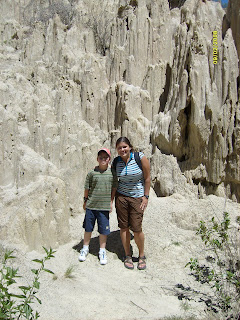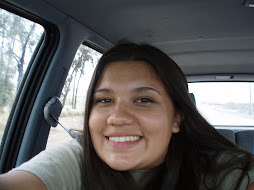This is my sister Ines at work in the office

Eastern Washington Anyone?

La casa de Armando

Armando explaining more about the significance of the drum symbols to me

Mapuche pride

 Armando, Alberto and Jose
Armando, Alberto and Jose The next day, after spending a very comfortable evening in a very comfortable bed at Ines´ I went to Cerro Nielol park and spent the morning hiking around paths through the woods and up to a volcano research center-observatory. The Prof. working there that came out to greet me has a friend teaching at Central Washington University. I didn´t think I would have a conversation about Mt. St. Helen´s that morning, but it was interesting to talk about the countries I have visited with someone who knows so much of the world through volcano studies whereas I am learning more about the world through indigenous issues and human rights.
Trees, flowers and steep hills were abundant in Cerra Nielol along with little lizzards and birds digging at the base of the bushes lining the paths. I could have easily convinced myself I was in a park near Seattle. Cerra Nielol also features some Mapuche carvings, I saw some like them when I was learning more about Mapuche people via google a year ago and was really surprised at how much the faces look like coast salish carvings. Maybe I shouldn't be so surprised by these sorts of things, but they never cease to spark my interest.
I walked back to the office and went with Alberto in his pick-up truck to run some errands, picking up Jose and his daughter and then moving books and furniture to Jose's (Jose's daughter and I spent most this time talking, she had assumed that Alberto was my grandfather). Then Jose and Alberto gave me three books that served as a great addition to the responses they were giving to the questions I had about Mapuche intercultural education, language preservation and legal positionality. A booklet of the laws concerning indigenous people in Chile, a book on intercultural education including bilingual education and my favorite: a book of poetry by school children, which really is the one that is more of my spanish language reading level. I started reading as we drove out towards Carahue which I was told was a city where Mapuche resistance had a long standing history. The Spanish started a city in the same area three times and according to Jose had planned the area to be the capitol of Chile or the main city, but each time the city was destroyed, burned to the ground. This is where Jose was born. The area is mostly agricultural *see above picture* and the wide glossy river Chol Chol was just within view when we pulled over and got out of the truck to visit with Armando.
While Jose first went down to the house to greet Armando, Alberto talked to me outside of the truck as we looked out on the valley. I would have given so much to have been able to better understand what he was telling me. I really couldn't though. Spanish in Chile is beyond difficult to understand, and became even more difficult when what he was saying became very heartfelt and emotional. I did understand that at one point he was talking about not having the professional training that someone else has (Jose?) being a campesino that has had a very different experience as a Mapuche... Earlier in the truck there was what seemed like a very light hearted comparison made by Alberto between himself and Jose. He told me that they were both Mapuche, but he was 'pure'. That you could tell that Jose was not pure because his hair was curly and Mapuche hair is thick and straight. The ways in which Indigenous identity are defined, discussed and interpretted is something that I have only been able to pick up on in bits and pieces in my travels. Language Barrier, what can I say. But this moment really sticks out to me, because it is an example of the ways that we often, even in the smallest and most light hearted ways, challenge eachothers identity, eachothers background. Whether it is based on phenotypical differences, cultural involvement, class, ect. we create "others" within our communities.
Moving on, we went down to the house to meet Armando and sat down at the table in his mostly unfurnished home. Hanging from the walls were dried bull kelp, corn (chocle), and a number of tools and instruments along with photos of him with several politicians at different gatherings. Armando was such a character, somehow I could understand him better, he had a much slower meter (possibly for dramatic emphasis) to his speech. Our greeting began with some joking, but became more serious when Alberto made an introduction for me, the story of why I was there with them. He explained how I had just been trying to go to an internet cafe when I stopped in and met him and his secretary, and that he felt that he needed to help me, that now he feels I am like a daughter to him and that he wanted to make sure I could learn more about what I came here to learn about. It was now time for me to give my talk, so a direct translation of what I said next would be: I am here because I think it is very important for indigenous people to know more about other indigenous people in the world, because we have different histories, but they are also the same, the same things, problems with the government, with rights, and also similar philosophies. That was about as good as I could get in explaining my purpose for showing up at Armando's. What followed was a heated discussion of water rights and land rights between the three men at the table. It started slowly, with the intention of explaining previous laws and ridiculous offenses made by the government, but then as the three men were swept into conversation I could no longer understand the words. Instead I saw the emotion, the fury, the loss, the impact of this topic on these three men that have been fighting for self-governance, rights and cultural preservation. When I had the opportunity, I asked a question about the Kultrun, the drum that I had seen so often associated with Mapuche culture. Armando's eyes brightened at this question. He went back into another room and brought out two drums. Carefully, he explained meanings of symbols and the different ways in which the Kultrun is used by Mache's. Jose and Alberto began pointing out other articles in the room, some of which seemed to be types of cultural property that they hadn't seen in a very long time. They taught me the names of these things and had me guess what they were for before explaining them to me. Meanwhile, Armando again went to a back room and returned with a big chest. He openned it and pulled out the regalia that he was wearing in the photos. The real surprise was that underneath these in the bottom of the chest was the full woman's regalia which my three "dad's" then helped me put on over my clothes, Alberto looked very proud when the outfit was complete.
Before leaving we talked about how good it would be for me to come back when I can speak more Spanish and understand Chilean. Alberto picked some berries for me from a boldo tree/bush while I said goodbye to Armando. The berries were very sweet despite being completely green. Alberto, Jose and I got back into the truck and went to see the town of Carahue. On the city sign it calls Carahue the city with three levels/floors, no mention of the city being destroyed three times. The river Chol Chol is runs wide and calm along this city, we didn't spend much time here though. On the drive back I realized just how much this place was like home. Like a drive home from Spokane with some uncles, is what I thought.
After dropping off Jose, Alberto and I went to his son's home to meet his family and have one of those late meals that Chile is known for. Alberto's son Luis works for the government in agricultural partnerships with Japan, so he told me a bit about his travels to Japan. Luis has clearly had a very different life than his father, something that Alberto pointed out was the result of the much more limited access to education and the higher levels of discrimation in his lifetime. I told him that my father could say the same for the differences between his school experiences and my own, and after telling them about the ways in which racism has impacted education for Native Americans Luis said (in English) "But there is supposed to always be freedom in your country, the American Dream"
"Si, La Sueno Americana, pero solo para los Blancos" I said. Alberto understood.
I went back to Ines' that night simply amazed at the odds of getting to see Chile in this way.








